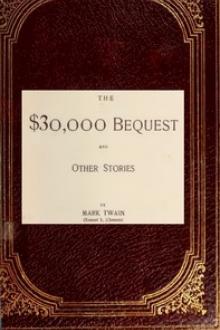The $30,000 Bequest, Mark Twain [best book club books for discussion TXT] 📗

- Author: Mark Twain
- Performer: 1406911003
Book online «The $30,000 Bequest, Mark Twain [best book club books for discussion TXT] 📗». Author Mark Twain
then outside, and farther and farther away—then back, and all
about the house again, and I thought it would never, never stop.
But at last it did, hours and hours after the vague twilight of
the garret had long ago been blotted out by black darkness.
Then in that blessed stillness my terrors fell little by little away,
and I was at peace and slept. It was a good rest I had, but I woke
before the twilight had come again. I was feeling fairly comfortable,
and I could think out a plan now. I made a very good one;
which was, to creep down, all the way down the back stairs,
and hide behind the cellar door, and slip out and escape when the
iceman came at dawn, while he was inside filling the refrigerator;
then I would hide all day, and start on my journey when night came;
my journey to—well, anywhere where they would not know me and betray
me to the master. I was feeling almost cheerful now; then suddenly
I thought: Why, what would life be without my puppy!
That was despair. There was no plan for me; I saw that;
I must say where I was; stay, and wait, and take what might come—
it was not my affair; that was what life is—my mother had said it.
Then—well, then the calling began again! All my sorrows came back.
I said to myself, the master will never forgive. I did not know
what I had done to make him so bitter and so unforgiving, yet I
judged it was something a dog could not understand, but which was
clear to a man and dreadful.
They called and called—days and nights, it seemed to me.
So long that the hunger and thirst near drove me mad, and I
recognized that I was getting very weak. When you are this way you
sleep a great deal, and I did. Once I woke in an awful fright—
it seemed to me that the calling was right there in the garret!
And so it was: it was Sadie’s voice, and she was crying; my name
was falling from her lips all broken, poor thing, and I could not
believe my ears for the joy of it when I heard her say:
“Come back to us—oh, come back to us, and forgive—it is all so sad
without our—”
I broke in with SUCH a grateful little yelp, and the next moment
Sadie was plunging and stumbling through the darkness and the lumber
and shouting for the family to hear, “She’s found, she’s found!”
The days that followed—well, they were wonderful. The mother
and Sadie and the servants—why, they just seemed to worship me.
They couldn’t seem to make me a bed that was fine enough;
and as for food, they couldn’t be satisfied with anything but game
and delicacies that were out of season; and every day the friends
and neighbors flocked in to hear about my heroism—that was the
name they called it by, and it means agriculture. I remember my
mother pulling it on a kennel once, and explaining it in that way,
but didn’t say what agriculture was, except that it was synonymous
with intramural incandescence; and a dozen times a day Mrs. Gray
and Sadie would tell the tale to new-comers, and say I risked my life
to say the baby’s, and both of us had burns to prove it, and then
the company would pass me around and pet me and exclaim about me,
and you could see the pride in the eyes of Sadie and her mother;
and when the people wanted to know what made me limp, they looked
ashamed and changed the subject, and sometimes when people hunted
them this way and that way with questions about it, it looked to me
as if they were going to cry.
And this was not all the glory; no, the master’s friends came,
a whole twenty of the most distinguished people, and had me in
the laboratory, and discussed me as if I was a kind of discovery;
and some of them said it was wonderful in a dumb beast, the finest
exhibition of instinct they could call to mind; but the master said,
with vehemence, “It’s far above instinct; it’s REASON, and many a man,
privileged to be saved and go with you and me to a better world
by right of its possession, has less of it that this poor silly
quadruped that’s foreordained to perish”; and then he laughed,
and said: “Why, look at me—I’m a sarcasm! bless you, with all
my grand intelligence, the only think I inferred was that the dog
had gone mad and was destroying the child, whereas but for the
beast’s intelligence—it’s REASON, I tell you!—the child would
have perished!”
They disputed and disputed, and I was the very center of subject
of it all, and I wished my mother could know that this grand honor
had come to me; it would have made her proud.
Then they discussed optics, as they called it, and whether a certain
injury to the brain would produce blindness or not, but they could
not agree about it, and said they must test it by experiment by and by;
and next they discussed plants, and that interested me, because in
the summer Sadie and I had planted seeds—I helped her dig the holes,
you know—and after days and days a little shrub or a flower came
up there, and it was a wonder how that could happen; but it did,
and I wished I could talk—I would have told those people about it
and shown then how much I knew, and been all alive with the subject;
but I didn’t care for the optics; it was dull, and when they came back
to it again it bored me, and I went to sleep.
Pretty soon it was spring, and sunny and pleasant and lovely,
and the sweet mother and the children patted me and the puppy
good-by, and went away on a journey and a visit to their kin,
and the master wasn’t any company for us, but we played together
and had good times, and the servants were kind and friendly,
so we got along quite happily and counted the days and waited
for the family.
And one day those men came again, and said, now for the test,
and they took the puppy to the laboratory, and I limped
three-leggedly along, too, feeling proud, for any attention shown
to the puppy was a pleasure to me, of course. They discussed
and experimented, and then suddenly the puppy shrieked,
and they set him on the floor, and he went staggering around,
with his head all bloody, and the master clapped his hands and shouted:
“There, I’ve won—confess it! He’s a blind as a bat!”
And they all said:
“It’s so—you’ve proved your theory, and suffering humanity owes
you a great debt from henceforth,” and they crowded around him,
and wrung his hand cordially and thankfully, and praised him.
But I hardly saw or heard these things, for I ran at once to my
little darling, and snuggled close to it where it lay, and licked
the blood, and it put its head against mine, whimpering softly,
and I knew in my heart it was a comfort to it in its pain and
trouble to feel its mother’s touch, though it could not see me.
Then it dropped down, presently, and its little velvet nose rested
upon the floor, and it was still, and did not move any more.
Soon the master stopped discussing a moment, and rang in the footman,
and said, “Bury it in the far corner of the garden,” and then went
on with the discussion, and I trotted after the footman, very happy
and grateful, for I knew the puppy was out of its pain now, because it
was asleep. We went far down the garden to the farthest end,
where the children and the nurse and the puppy and I used to play
in the summer in the shade of a great elm, and there the footman dug
a hole, and I saw he was going to plant the puppy, and I was glad,
because it would grow and come up a fine handsome dog, like Robin Adair,
and be a beautiful surprise for the family when they came home;
so I tried to help him dig, but my lame leg was no good, being stiff,
you know, and you have to have two, or it is no use. When the
footman had finished and covered little Robin up, he patted my head,
and there were tears in his eyes, and he said: “Poor little doggie,
you saved HIS child!”
I have watched two whole weeks, and he doesn’t come up! This last week
a fright has been stealing upon me. I think there is something terrible
about this. I do not know what it is, but the fear makes me sick,
and I cannot eat, though the servants bring me the best of food;
and they pet me so, and even come in the night, and cry, and say,
“Poor doggie—do give it up and come home; DON’T break our hearts!”
and all this terrifies me the more, and makes me sure something
has happened. And I am so weak; since yesterday I cannot stand on my
feet anymore. And within this hour the servants, looking toward the
sun where it was sinking out of sight and the night chill coming on,
said things I could not understand, but they carried something cold
to my heart.
“Those poor creatures! They do not suspect. They will come home
in the morning, and eagerly ask for the little doggie that did
the brave deed, and who of us will be strong enough to say the truth
to them: ‘The humble little friend is gone where go the beasts
that perish.’”
***
WAS IT HEAVEN? OR HELL?
“You told a LIE?”
“You confess it—you actually confess it—you told a lie!”
The family consisted of four persons: Margaret Lester, widow,
aged thirty six; Helen Lester, her daughter, aged sixteen;
Mrs. Lester’s maiden aunts, Hannah and Hester Gray, twins, aged
sixty-seven. Waking and sleeping, the three women spent their days
and night in adoring the young girl; in watching the movements
of her sweet spirit in the mirror of her face; in refreshing their
souls with the vision of her bloom and beauty; in listening to the
music of her voice; in gratefully recognizing how rich and fair
for them was the world with this presence in it; in shuddering
to think how desolate it would be with this light gone out of it.
By nature—and inside—the aged aunts were utterly dear and lovable
and good, but in the matter of morals and conduct their training
had been so uncompromisingly strict that it had made them
exteriorly austere, not to say stern. Their influence was effective
in the house; so effective that the mother and the daughter
conformed to its moral and religious requirements cheerfully,
contentedly, happily, unquestionably. To do this was become
second nature to them. And so in this peaceful heaven there
were no clashings, no irritations, no fault-finding, no heart-burnings.
In it a lie had no place. In it a lie was unthinkable.
In it speech was restricted to absolute truth, iron-bound truth,
implacable and uncompromising truth, let the resulting consequences
be what they might. At last, one day, under stress of circumstances,
the darling of the house sullied her lips with a lie—and confessed it,
with tears and self-upbraidings. There are not any words that can paint
the consternation of the aunts. It





Comments (0)